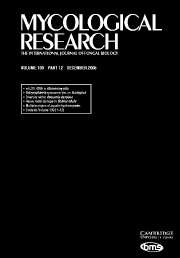Crossref Citations
This article has been cited by the following publications. This list is generated based on data provided by
Crossref.
Thornton, Christopher R.
Groenhof, Andrew C.
Forrest, Robert
and
Lamotte, Richard
2004.
A One-Step, Immunochromatographic Lateral Flow Device Specific toRhizoctonia solaniand Certain Related Species, and Its Use to Detect and QuantifyR. solaniin Soil.
Phytopathology®,
Vol. 94,
Issue. 3,
p.
280.
Kõljalg, Urmas
Larsson, Karl‐Henrik
Abarenkov, Kessy
Nilsson, R. Henrik
Alexander, Ian J.
Eberhardt, Ursula
Erland, Susanne
Høiland, Klaus
Kjøller, Rasmus
Larsson, Ellen
Pennanen, Taina
Sen, Robin
Taylor, Andy F. S.
Tedersoo, Leho
Vrålstad, Trude
and
Björn M. Ursing
2005.
UNITE: a database providing web‐based methods for the molecular identification of ectomycorrhizal fungi.
New Phytologist,
Vol. 166,
Issue. 3,
p.
1063.
Irwin, Mathew John
Dearnaley, John David William
and
Bougoure, Jeremy James
2007.
Pterostylis nutans (Orchidaceae) has a specific association with two Ceratobasidium root-associated fungi across its range in eastern Australia.
Mycoscience,
Vol. 48,
Issue. 4,
p.
231.
Sharon, Michal
Freeman, Stanley
Kuninaga, Shiro
and
Sneh, Baruch
2007.
Genetic diversity, anastomosis groups and virulence of Rhizoctonia spp. from strawberry.
European Journal of Plant Pathology,
Vol. 117,
Issue. 3,
p.
247.
Sharon, Michal
Sneh, Baruch
Kuninaga, Shiro
Hyakumachi, Mitsuro
and
Naito, Shigeo
2008.
Classification of Rhizoctonia spp. using rDNA-ITS sequence analysis supports the genetic basis of the classical anastomosis grouping.
Mycoscience,
Vol. 49,
Issue. 2,
p.
93.
Okubara, P. A.
Schroeder, K. L.
and
Paulitz, T. C.
2008.
Identification and Quantification of Rhizoctonia solani and R. oryzae Using Real-Time Polymerase Chain Reaction.
Phytopathology®,
Vol. 98,
Issue. 7,
p.
837.
Grönberg, H.
Hietala, A. M.
and
Haahtela, K.
2009.
Analysing scots pine defence‐related transcripts and fungal DNA levels in seedlings single‐ or dual‐inoculated with endophytic and pathogenic Rhizoctonia species.
Forest Pathology,
Vol. 39,
Issue. 6,
p.
377.
Zhou, Qi-Xing
Chang, Kan-Fa
Hwang, Sheau-Fan
Strelkov, Stephen E.
Gossen, Bruce D.
and
Chen, Yong-Yan
2009.
Pathogenicity and genetic diversity ofRhizoctonia solaniisolates from lupin and other crops in Alberta, Canada.
Canadian Journal of Plant Pathology,
Vol. 31,
Issue. 3,
p.
340.
Fang, Xiangling
Finnegan, Patrick M.
Barbetti, Martin J.
and
Gerardo, Nicole M.
2013.
Wide Variation in Virulence and Genetic Diversity of Binucleate Rhizoctonia Isolates Associated with Root Rot of Strawberry in Western Australia.
PLoS ONE,
Vol. 8,
Issue. 2,
p.
e55877.
Chen, Yongyan
Zhou, Qixing
Strelkov, Stephen E.
and
Hwang, Sheau-Fang
2014.
Genetic Diversity and Aggressiveness of Fusarium spp. Isolated from Canola in Alberta, Canada.
Plant Disease,
Vol. 98,
Issue. 6,
p.
727.
Zhou, Q. X.
Hwang, S. F.
Fu, H. T.
Strelkov, S. E.
and
Gossen, B. D.
2014.
Genetic variation ofRhizoctonia solaniisolates from canola in Alberta, Canada.
Canadian Journal of Plant Science,
Vol. 94,
Issue. 4,
p.
671.
Patel, Jaimin S.
Brennan, Mary S.
Khan, Aftab
and
Ali, Gul Shad
2015.
Implementation of loop-mediated isothermal amplification methods in lateral flow devices for the detection ofRhizoctonia solani.
Canadian Journal of Plant Pathology,
Vol. 37,
Issue. 1,
p.
118.
Zhou, Qixing
Yang, Yalong
Wang, Yingli
Jones, Chris
Feindel, David
Harding, Michael
and
Feng, Jie
2021.
Phylogenetic, phenotypic and host range characterization of five Fusarium species isolated from chickpea in Alberta, Canada.
Canadian Journal of Plant Pathology,
Vol. 43,
Issue. 5,
p.
651.


